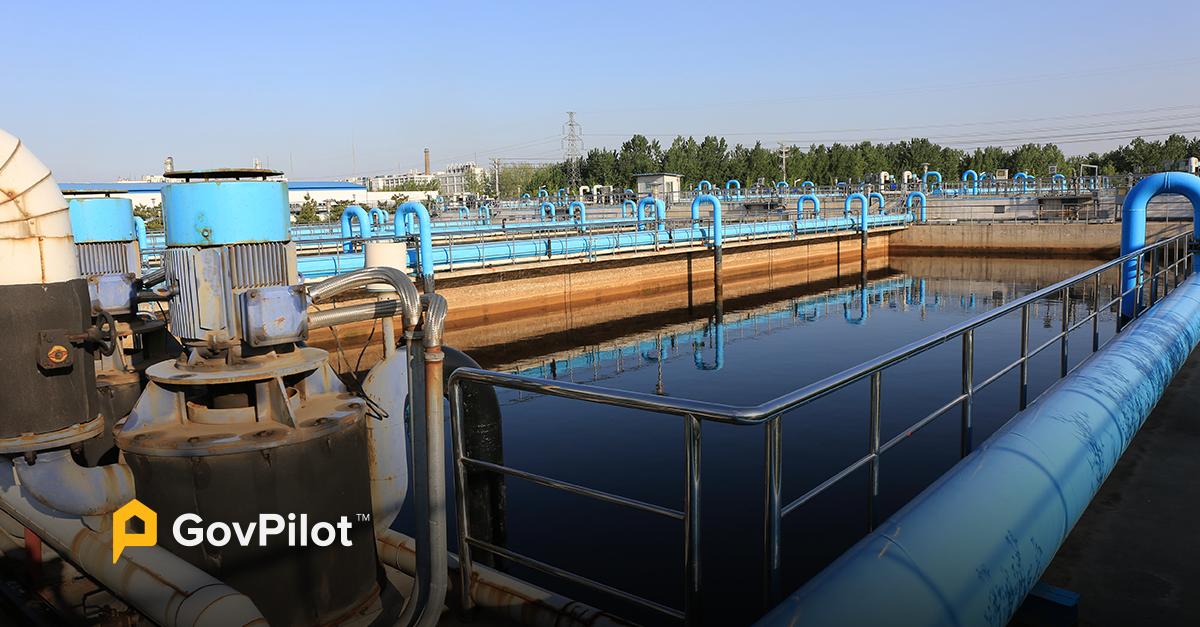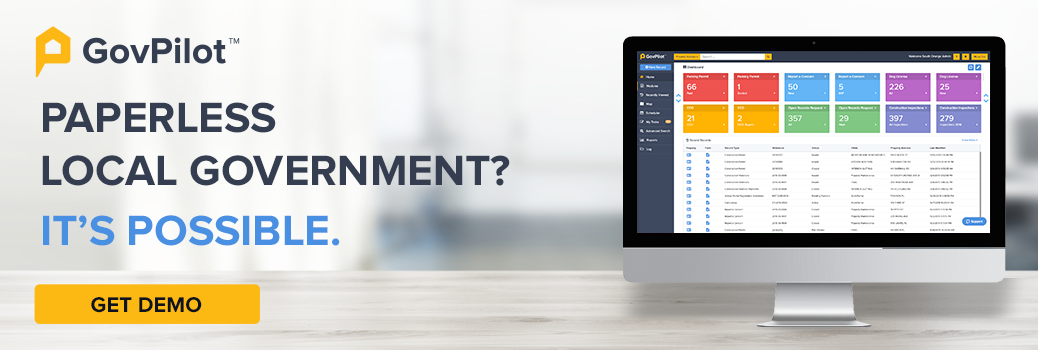Accessing clean and safe drinking water should be as straightforward as turning the tap on your faucet. But local governments are making it into the national spotlight more and more frequently due to their failure to provide this essential resource to residents because of aging water infrastructure and other preventable issues.
Flooding and years of deferred water infrastructure maintenance in Jackson, Mississippi recently left more than 100,000 people without access to clean water. And we’re all familiar with the public health crisis in Flint, Michigan, where residents suffered for more than a year before the city began to address elevated levels of lead in the water.
In addition to these events, extreme weather and droughts point to the need to modernize our local government water utilities management. In this post, we’ll dive into exactly why this is so vital and offer tips about how you can start the process.
What is modern local government water utilities management?
At its most basic, local water utilities management involves routing water within a municipality to wherever it needs to go. But undertaking this process efficiently and effectively is anything but basic. Each day, water utilities managers must take action to:
- Ensure water is clean and safe for human consumption
- Direct stormwater away from streets and buildings
- Minimize pollutants that reach creeks, streams, rivers, lakes, and other bodies of water
- Route and treat sewage and wastewater
- Upkeep water infrastructure
- Manage water resources sustainably
To accomplish these interrelated but distinct tasks, public organizations must take a holistic approach to local water utilities management. This approach involves promoting public health, maintaining and upgrading infrastructure, protecting the environment, and educating residents. Let’s discuss each of these factors in more detail next.
Health
Water utilities management, first and foremost, requires that every citizen can access clean and safe water for drinking, cooking, and bathing. As such, local governments conduct regular water quality tests to ensure water is safe. These tests might include looking for heavy metal contaminants like lead or biohazards like E. coli.
Local governments are also responsible for informing residents about water concerns that may impact their health. For example, if there’s recently been an algal bloom in a municipality’s water supply, governments must test the water and inform residents if it has become unsafe to drink.
Infrastructure
Each day in the United States, between 14% and 18% of treated water is lost due to water pipeline leaks. Properly maintaining water infrastructure is evidently vital to local government water utilities management. This maintenance includes ensuring existing water pipelines:
- Meet modern safety standards
- Do not leak
- Can support a municipality’s growing population, among many other considerations.
Because much of America’s water infrastructure is outdated, water utilities managers must be proactive in updating old pipelines, including those that still contain lead. Local governments must also build infrastructure that appropriately redirects stormwater, especially as a population grows and more impervious surfaces are built up in the community.
How Can Your Local Government Build Disaster Resilient Infrastructure? Here’s what to know.
Environment
Modern local government water utilities management also requires careful consideration of how an organization’s actions impact surrounding ecosystems and communities. Environmental water management thus involves activities that promote responsible and energy-efficient water treatment and usage.
Likewise, local governments must implement and enforce policies and programs that help protect waterways (including groundwater and surface water) from pollutants. These actions include teaching residents about household contaminants like oil, pet waste, and antifreeze, and encouraging environmentally-friendly construction and agriculture practices, including minimizing the amount of sediment and pesticides that enter waterways.
Here’s some helpful resources about disaster mitigation and local environmental considerations:
- Local Government Flooding Mitigation: What to Know
- Local Government Wildfire Mitigation: What to Know
- Local Government Invasive Species Management: What to Know
- Local Government Disaster Preparedness
Education
As indicated above, environmental protection requires action from community members, businesses, and local governments. As a result, an effective water management strategy involves proactively educating community stakeholders about appropriate water management practices. Government officials should host community meetings to inform residents about actions they can take to promote water conservation efforts and protect their water. These actions might include installing low-flow toilets in their homes, picking up after their pets, properly maintaining their septic systems, purchasing water filters custom built to accommodate for your water conditions and other more localized advice and information.
Why Has Upgrading Water Systems Grown Increasingly Important?
Today governments face increasingly complex challenges, from outdated infrastructure to nationwide droughts and paralyzing government data breaches. As a result, public organizations must go above and beyond status quo water utilities management to ensure every resident can access vital water resources.
Outdated infrastructure
The water pipelines and infrastructure we built in the 20th century are increasingly antiquated: America’s deferred maintenance is catching up with us. Water infrastructure repairs are often far more involved than they would have been with regular maintenance. As a result, municipalities must spend considerable sums of money to bring water infrastructure into the 21st century. This maintenance includes replacing between 6 and 10 million lead service lines, like those in Flint, Michigan, that still exist across the U.S.
To complicate matters further, extreme weather events exacerbate infrastructure deficits. Dilapidated systems can’t adequately adapt during flooding or other severe weather, as occurred in Jackson, Mississippi when clean water was rendered inaccessible to the entire city. In light of the ongoing climate crisis, it’s thus vital that local governments modernize outdated infrastructure.
Learn more about how recent legislation like the American Rescue Plan Act can put federal grants into use in your neighborhood’s infrastructure development.
National droughts
The United States has also contended with increasingly extensive droughts in recent decades. In particular, the Southwest has faced droughts since 1990, causing the region’s water supply in Lake Mead and Lake Powell to decline drastically. Modern local government water utilities strategy thus requires careful thought about water conservation and sustainable water practices, both now and in the future. Cities that fail to adapt to changing water availability increase their risk of water shortages, particularly as our earth continues to warm.
Cyberattacks
A myriad of motives drive cyber attacks, but underlying them all is an implicit desire to demonstrate power. And given the critical role of water in maintaining life, many cyber criminals seek power and control over our community’s water supplies.
These cyberattacks on water utilities have become more and more prevalent in the past decade and range in severity from phishing attempts to ransomware attacks that compromise an entire system’s ability to function. In some cases, cyberattacks have gone beyond mere demonstrations of power and actively sought to harm, such as the attempted poisoning of a Florida city’s water supply. Cybersecurity is thus a vital component of any modern water utilities strategy.
Here are helpful resources pertaining to your local cybersecurity strategy:
- Local Government Cybersecurity: Everything to Consider
- How to Train Government Workers on Cybersecurity
How You Can Improve Your Local Government Water Utilities Strategy
While water utilities challenges are complex, there are a few actions local governments can take to address them. Below are considerations that can help inform your modern water utilities strategy.
Improve Processes for Strategic Water Management
In addition to using government management software, you should continually promote strategic water management decisions. Accomplishing this requires careful attention to how short-term decisions impact long-term water management.
Every water utilities management agency should have a carefully thought-through strategic plan that considers water infrastructure longevity and sustainability. You can refer to this strategic plan when advocating for budget allocations during the budget and CIP processes. By clearly delineating how budget requests connect to your strategic plan, your agency increases the likelihood of receiving critical resources to modernize its water infrastructure.
Another way you might improve processes for strategic water management is by using technology that enables employees to take notes in the field. Employees can then use this information to provide clear examples of repair needs during budget presentations. In doing so, you provide yet another means to strategically align water management needs with the resources required to accomplish them.
Use Government Water Utility Management Technology
With so many divisions and projects to track, from stormwater management to wastewater treatment and water conservation, it’s easy to get overwhelmed. Government management software makes project management more straightforward as you work to upgrade infrastructure, promote public health, minimize pollution, and educate residents. GovPilot’s software automates workflows and routes requests directly to the relevant staff, so projects always move forward on time.
Additionally, GovPilot’s local government software can help your water utilities department collect and share meaningful data. Report a Concern software from citizens provides an online and mobile form that citizens can submit to your department whenever they have a water-related concern. This tool enables you to get immediate feedback about actions that may negatively impact water quality or infrastructure, such as illegally dumping into a creek.
Feedback can also be viewed on GovPilot’s GIS maps to identify where water concerns are concentrated. You can use these maps to track the locations of water and sewer lines or view planning zones relevant to your water utilities management.
Plus, government technology can improve your cybersecurity efforts. By deploying firewalls and encrypting data, you prevent water systems data and systems from being compromised. Other practices that make up a comprehensive cybersecurity strategy include educating employees about how to identify phishing attempts, regularly updating passwords, and implementing two-factor authentication.
Promote Sustainability
The success of a community’s water utilities strategy depends on the residents who live within it. To effectively promote sustainable water practices, your agency must be proactive in educating residents and implementing sustainable water management practices yourself. Some sustainably-oriented water management actions you and residents might undertake are listed below:
- Recycle water, such as using grey water for watering non-edible plants
- Upgrading water systems to conserve water, such as installing low-flow plumbing fixtures
- Facilitating better rainwater capture and collection
- Considering how water management decisions promote equity in your community
- Repairing leaky pipes, both at home and across your water infrastructure system
Learn more helpful eco-friendly strategies in the Local Government Sustainability guide.
Leverage Technology to Upgrade Your Water Infrastructure
Your agency plays a vital role in ensuring that every resident can access critical water resources – both now and in the future. And while today’s challenges may feel overwhelming, you can take a few simple steps to promote sustainable, responsible water utilities management. When you leverage GovPilot’s technology, you streamline critical processes, gain valuable access to data, and promote strategic local government water utilities management.
Read on:
- Local Government Accountability: Operating a Truly Ethical Local Government
- Modern Government Trends, Events, & Technology
- Continuity of Government: Government Procedures During a Crisis
- Government Cybersecurity: How to Prevent Ransomware Attacks
- Local Government Automation: Benefits of Going Digital
- Government Blockchain: How Local Government Can Use Crypto
- How Local Governments Can Encourage Civic Engagement
- How Do Online Permitting Systems Work?
- What is GovTech? Everything to Know About Government Technology
- Best Software for Government Procurement
- Building Inspections 101: How Municipalities Can Improve Public Safety
- Municipal Planning: Reclaiming Your City Streets
- Government Fee & Fine Processing: Everything to Know
- Encouraging Civic Engagement at the Local Level







